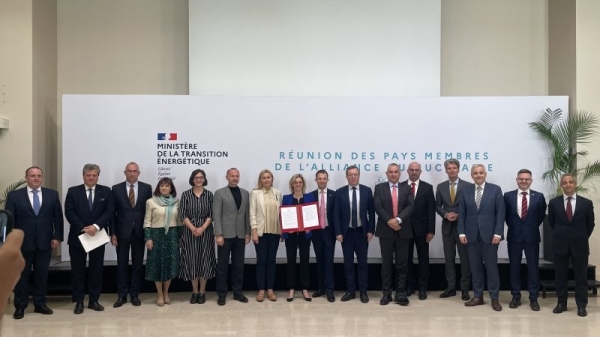Nuclear alliance aims for 150 GW of nuclear power in EU by 2050

The 16 European countries participating in the “nuclear alliance” will prepare a roadmap to develop an integrated European nuclear industry reaching 150 GW of nuclear power in the EU’s electricity mix by 2050.
The French Minister for Energy Transition, Agnès Pannier-Runacher, brought in Paris on Tuesday morning (16 May) 15 ministers and high-level representatives from Belgium, Bulgaria, Croatia, the Czech Republic, Finland, Hungary, the Netherlands, Poland, Romania, Slovenia, Slovakia, Estonia, Sweden, Italy as an observer and the United Kingdom as a guest. They are all part of the “nuclear alliance”.
Sweden did attend, although it had remained neutral in previous meetings due to its role as EU Council President.
On Tuesday, the group met exclusively to discuss the alliance after a first meeting in Stockholm at the end of February on the margins of an informal summit of EU member states and a second in Brussels at the end of March on the sidelines of a European Energy Council.
The UK is currently developing two EPR2 nuclear reactors at Hinkley Point C, and two more are in the early stages.
Together, the representatives signed a joint declaration in which they hope nuclear energy could represent 150 GW of installed capacity in the EU by 2050. To achieve this, the alliance’s stakeholders urge the European Commission to promote this policy “in the EU’s energy strategy”, reads the joint declaration signed on Tuesday.
EU Energy Commissioner Kadri Simson said she was in Paris “to listen to [the represented states’] concerns”.
Ahead of a further meeting, likely on 19 June in Luxembourg on the margins of the European Energy Council, the states parties to the alliance will prepare a roadmap to detail their ambitions.
The European Commission has also “asked for a common paper highlighting the nature of the projects”, said Pannier-Runacher.

Interest in French-led nuclear alliance gathers momentum
French Energy Transition Minister Agnes Pannier-Runacher will meet on Tuesday (16 May) with representatives of 15 other European states as part of the so-called “nuclear alliance” – an increase compared to the 11 that had shown interest just two months ago.
30 to 45 new reactors and new jobs
Currently, nuclear energy represents 100 GW of installed capacity in the EU. To reach 150 GW by 2050, the French Ministry of Energy Transition is counting on the continued operation of existing installations and “the construction of 30 to 45 new large reactors as well as the development of small modular reactors (SMR) in the EU”.
The minister said that this number comes “roughly from the review of the different projects that are being considered in the discussions that we all have on raising our carbon trajectories”, combined with the replacement of old nuclear reactors.
With 150 GW, nuclear power could thus maintain its current share of 25% of the EU’s electricity production by 2050, the minister added.
Also, an additional 50 GW represents 450,000 additional jobs in Europe. “This is enormous”, says Pannier-Runacher.
Taking into account retirements, this represents more than 300,000 direct and indirect jobs created between now and 2050, including 200,000 skilled jobs, the French Ministry of Energy Transition stated in a press release.
To achieve this, the alliance members are asking the European Commission to support the development of “joint initiatives”. As for the alliance, it will work to build “joint exchange programmes between technicians and engineers”, it says in its joint declaration.

Nuclear vs renewables: Two camps clash in Brussels
EU energy ministers were divided into two camps at the EU Council meeting on Tuesday (28 March): the pro-nuclear alliance, which includes France and 10 other member states, and the “renewable friendly” group, composed of 10 EU states.
New joint projects
Another focus is the pooling of forces in the development of SMRs, more consensual at the European level. The member states of the alliance are thus ready to work on processes for “standardising the design of new nuclear reactors”.
For that, the EU must promote “better conditions” and “better access to financing”, declared the signatory states of the joint declaration.
They refer to the Net-Zero Industry Act presented by the European Commission in mid-March. The text make a difference between nuclear and other decarbonised technologies.
“This is a point of consideration” for the alliance members, Pannier-Runacher said.

EDF reactor boss urges Brussels to make ‘clear commitment’ to nuclear
The European Commission should make a “clear commitment” to nuclear, the president of French energy giant EDF’s small nuclear reactor project, Renaud Crassous, told EURACTIV France in an interview, describing the EU’s Net-Zero Industry Act proposal as a failure.
Safety and independence
Finally, the 16 countries discussed how to “help European countries that are still dependent on Russia to reduce their dependence”, said the French energy minister.
Hungary, Slovakia and Bulgaria, which attended the meeting, are among these dependent countries, as they have Russian-built reactors on their soil, supplied by Russian fuel. However, it will “probably take a decade or so to be able to replace the nuclear fuel supply” of these Russian reactors with other fuel, said Pannier-Runacher.
The joint discussion on this topic “is a big step forward in advancing our clean energy security”, Bulgarian Energy Minister Rosen Hristov said.
The UK participated in the second morning meeting on the operability of the nuclear revival in Europe. In this context, the British Secretary of State for Nuclear Energy, Andrew Bowie, shared his experience of the Hinkley Point C construction site.
For the British representative, this meeting was “a fantastic opportunity for the UK to get involved and learn from our European counterparts”.

Pressure mounts on EU to sanction Rosatom in next Russia sanctions package
With the European Commission having started work on the 11th Russia sanctions package since its invasion of Ukraine, Russia hardliners are reviving pressure to target the country’s nuclear industry.
Read more with EURACTIV




